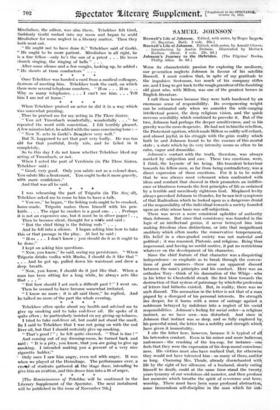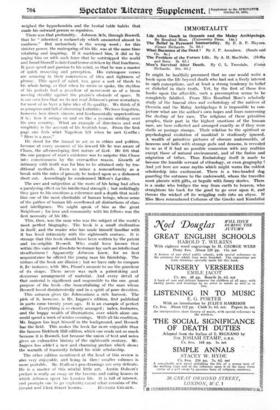SAMUEL JOHNSON
Boswell's Life of Johnson. Edited, with notes, by Roger Ingpert.1- (G. Bayntun. Bath. 2 vols. 36s.) WITH its characteristic passion for exploring the mediocre, our generation neglects Johnson in favour of his satellite Boswell. I must confess that, in spite of my gratitude to the impulsive Scotsman, too much of his company stifles Me, and I long to get back to the rough grandeur of the fumbling- old giant who, with Milton, was one of the greatest heroes in English literature.
I call them heroes because they were both burdened by an enormous sense of responsibility. Its overpowering weight can be estimated only when we .consider the wide-ranging intellectual power, the deep religious vision, and the quick- nervous sensibility which combined to provoke it. But of the two, Johnson had perhaps the deeper sensitiveness, and so his gravity was the more desperate. He had not in him the rebellion, the Protestant egotism, which made Milton so coldly self-reliant, and almost joyful, in his struggle with the grim reality which both he and Johnson found to be the essence of this mortal state ; a state which by its very intensity seems so often to be calm, vague and dreamlike.
Johnson's contact with the truth, therefore, was always marked by subjection and awe. These two emotions, were, I think, the keynote of his being. His truculent behaviour towards his fellow-men, so far from being contradictory, was a direct expression of those emotions. For it is to be noted that he was always most vehement when confronted with ideas and conduct that showed in their promoters an indiffer- ence or bluntness towards the first principles of life as ordained by a terrible and mercilessly righteous God. Misplaced levity always provoked Johnson to thunder, for he saw in it symptoms of that Radicalism which he looked upon as a dangerous denial of the responsibility of the individual towards a society founded upon an ethic whose basis was self-subjection.
Thera was never a more consistent upholder of authority than Johnson. But since that consistency was founded in the logic of an intellectual genius, it never betrayed him into making frivolous class distinctions, or into that insignificant snobbery which often marks the conservative temperament,. His belief in a class-graded society was not material and political ; it was reasoned, Platonic, and religious. Being thus impersonal, and having no sordid motive, it put no restrictions whatever on the development of his character.
Since the chief feature of that character was a disquieting independence—so emphatic as to break through the conven-: re tions of good manners—there arose an appant discord between the man's principles and his conduct. Here was an, orthodox Tory—think of his damnation of the Whigs—who, in his letter to Chesterfield struck the first blow towards the destruction of that system of patronage by which the profession of letters had hitherto existed. But, in reality, there was no' such discord. The accusation in the letter is not that of a man: piqued by a disregard of his personal interests. Its strength lies deeper, for it burns with a sense of outrage against a nobleman betrayed by indolence into a neglect of his social responsibilities. Johnson's feeling for social order—a religious' instinct, as we have seen—was disturbed. And since in Johnson that instinct was so deep, and so fully explored by his powerful mind, the letter has a nobility and strength which. have given it immortality.
I cite the letter here, however, because it is typical of all; 'his heterodox conduct. Even in his minor and more ludicrous, rudenesses—the crushing of the tea-cup, for instance—or* feels that :they were the expression of his deep moral conscious% mess. His victims must also have realized that, for otherwise they would not have tolerated him—so many of them, and foi so long. Charming Mrs. Thrale, already disenchanted with; life by the sight of her silkworm of a husband, slowly eating himself to death; could at the same time- stand the twenty, years tyranny of our scrofulous old monster, and then produce her memoirs, which breathe the spirit of reverence and hero.. worship. There must have been some_profound_ abstraction, some tremendous self-discipline in the man which Mr Out- weighed the hypochondria and the bestial table habits that made his outward person so repulsive.
There was that profundity. Johnson through Boswell, that he " inherited a melancholy which amounted almost to madness." But melancholy is the wrong word ; for this sinister power, the mainspring of his life, was at the same time vitalizing and inspiring.. If it maddened him, it did so by urging him on with such force that he outstripped the world and found himSelf isolated and terror-stricken by that loneliness. It gave speed and passion to his mind, so that he was a master of quick reasoning and perception. His extempore verses are amazing in their conciseness of idea and tightness of phrase. • This speed of mind, too, gave a sort of throb to his whole being, so that when he wrote or spoke, the rhythm of his periods had a grandeur of movement as of a bison moving steadily against the prairie's obstacle of space. It is our own loss that we do not read Johnson's prose nowadays, for most of us have a false idea of its quality. We think of it as pompous and full of obscuring Latinities. We have forgotten, however, how direct, sincere, and fundamentally unpretentious it is ; how it swings on and on like a yeoman striding over his own country. What an example of directness and real simplicity is the account of his Scottish tour. From the first page one feels what Napoleon felt when he met Gaethe : " Here is a man."
He stood for the formal in art as in ethics and politics, because at every moment of his inward life he was aware of Chaos, . the all-enveloping first nature of God. He felt that the one purpose of man's existence was to surprise this Chaos into consciousness by the ever-active reason. Growth of intimacy with truth was for him to be attained only by tra- ditional methods. Even so minor a nonconformity as a break with the rules of prosody he looked upon as a dishonest short cut. Accordingly he condemned Milton's Lycidas.
The awe and subjection at the roots of his being had often a paralysing effect on his intellectual strength ; but unfailingly they gave to his emotions a coherence and a depth that made him one of the most charitable of human beings, whose sense of the pathos of human life overflowed all distinctions of class and intelligence. We might speak of him as the great Neighbour ; for love and community with his fellows was the first necessity of his life.
This, then, was the man who was the subject of the world's most perfect biography. The book is a small civilization in itself, and the reader who has made himself familiar with it has lived intimately with the eighteenth century. It is strange that this book should have been written by the patent and incorrigible Boswell. Who could have known that within this vain and dissolute Scotsman lay such an intellectual steadfastness ? Apparently Johnson knew, for on first acquaintance he offered the young man his friendship. The virtues of the book are illusive ; but we have only to compare it, for instance, with Mrs. Piozzi's memoir to see the grandeur of its shape. There never was such a painstaking and dexterous arrangement of material. - And every detail. of that material is significant and responsible to the one great purpose of the book—the immortalizing of the man whom Boswell loved disinterestedly and in a spirit of pure devotion.
This autumn gives the Johnsonians a rich harvest. The pick of it, however, is Mr. Ingpen's edition, first published in parts some twenty years ago. It is an example of perfect editing. Everything is so clearly arranged ; index, footnotes, and the happy wealth of illustrations, over which alone one could spend a week of winter evenings. With all his erudition, Mr. Ingpen has kept himself in the background, and Boswell has the field. This makes the book far more enjoyable than the famous Birkbeck Hill edition, which one reads not so much because it is Boswell, but because the union of text and notes gives an exhaustive history of the eighteenth century. Mr. Ingpen has added a new and charming preface which shows the warmth of humanity behind his wide scholarship.
The other edition mentioned at the head of this review is also very enjoyable, and being in three smaller volumes is more portable. Mr. Railteres pen-drawings are very delicate. He is a master of this wistful little art: Austin Dobson's preface is really an essay on the taverns and eating houses in which Johnson spent his London life. It is full of interest, and prompts one to go exploring round what-remains of the &trand and Need. Street haunts... .. Htcuann Clitnen.































































 Previous page
Previous page